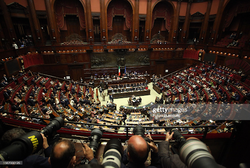Kaminoa Dieta: Difference between revisions
No edit summary |
No edit summary |
||
| (11 intermediate revisions by the same user not shown) | |||
| Line 1: | Line 1: | ||
{{Template:WIP}} | {{Template:WIP}} | ||
{{Infobox legislature | {{Infobox legislature | ||
| name = The Caminoan Parliament | | name = The Caminoan Parliament | ||
| native_name = Kaminoa Dieta <small>( | | native_name = Kaminoa Dieta <small>(Caminoan)</small> | ||
| native_name_lang = Caminoan | | native_name_lang = Caminoan | ||
| transcription_name = | | transcription_name = | ||
| Line 26: | Line 26: | ||
| party2 = {{wpl|Caminoes Social Democrats|CSD}} | | party2 = {{wpl|Caminoes Social Democrats|CSD}} | ||
| seats = '''600''' | | seats = '''600''' | ||
| structure1 = | | structure1 = Kamino_Dieta_2023_TWIN.png | ||
| structure1_res = | | structure1_res = | ||
| structure1_alt = | | structure1_alt = | ||
| political_groups1 = | | political_groups1 = | ||
;[[Lena Haidynraix government|Government]] | ;[[Lena Haidynraix government|Government]] | ||
:{{color box| | : {{color box|#0000FF}} CdC (122) | ||
:{{color box| | :{{color box|#7A1BB4}} Moderates (118) | ||
:{{color box| | :{{color box|#F10707}} CSD (100) | ||
:{{color box|#11A223}} Greens (88) | |||
:{{color box|#4FD891}} CENTRUM (59) | |||
;Opposition | ;Opposition | ||
:{{color box| | :{{color box|#FDE00F}}Nacionalista Caminoes (70) | ||
:{{color box| | :{{color box|#B62525}}DSA (24) | ||
:{{color box| | :{{color box|#12CDCD}} Federalists (13) | ||
:{{color box|#0E5381}} DLP (5) | |||
| joint_committees = [[Caminoan Parliament#Committees|28]] | |||
| voting_system1 = {{wpl|Proportional Representation}} | |||
| last_election1 = [[Caminoan federal election, 2020|22 January 2020]] | |||
:{{color box| | |||
| joint_committees = [[ | |||
| voting_system1 = {{wpl| | |||
| last_election1 = [[ | |||
| last_election2 = | | last_election2 = | ||
| next_election1 = [[ | | next_election1 = [[Caminoan general election, 2025|22 January 2024]] | ||
| next_election2 = | | next_election2 = | ||
| session_room = | | session_room = | ||
| session_res = | | session_res = | ||
| session_alt = | | session_alt = | ||
| meeting_place = Parliament Building, | | meeting_place = Parliament Building, Shojungun, [[State of Sagacity|Sagacity]] | ||
| website = http://www.parliament. | | website = http://www.parliament.gov.cm/ | ||
| footnotes = | | footnotes = | ||
| motto = | | motto = | ||
}} | }} | ||
{{Politics of | {{Politics of Caminoes}} | ||
The '''Kaminoa Dieta''' ({{wpl|English language|English}}: ''Caminoan Parliament'') is the {{wpl|unicameral}} {{wpl|federation|federal}} {{wpl|legislature}} of [[Caminoes]]. It consists of one chamber presided over by[[The Speaker of the Dieta | The '''Kaminoa Dieta''' ({{wpl|English language|English}}: ''Caminoan Parliament'') is the {{wpl|unicameral}} {{wpl|federation|federal}} {{wpl|legislature}} of [[Caminoes]]. Serving as the {{wpl|supreme legislative body}} of the country, convening at the [[Shojungun]] (Federal Dieta House). Most of the lesgislative power is concentrated on the Dieta and therefore holds {{wpl|Parliamentary sovereignty|legislative supremacy}} allowing it to be the primary overseer of all legislation and be the primary deliberative body on [[Caminoan Law]]. It consists of one chamber presided over by [[The Speaker of the Dieta]]. | ||
The Dieta is composed of 600 seats (fixed) and adjusts when there are overhang seats[[https://en.wikipedia.org/wiki/Overhang_seat]], this is due to the {{wpl|proportional representation}} electoral system that the country has. Members of Parliament who are elected for the first time are granted a 5-year first term and once re-elected are granted 4 more years, an additional 4 are then granted for the subsequent elections they win, MP's only leave The Dieta after one of two circumstances, either through losing their seat in an election or by retiring/resigning. | The Dieta is composed of 600 seats (fixed) and adjusts when there are overhang seats[[https://en.wikipedia.org/wiki/Overhang_seat]], this is due to the {{wpl|proportional representation}} electoral system that the country has. Members of Parliament who are elected for the first time are granted a 5-year first term and once re-elected are granted 4 more years, an additional 4 are then granted for the subsequent elections they win, MP's only leave The Dieta after one of two circumstances, either through losing their seat in an election or by retiring/resigning. | ||
The numerous and diverse demographics of the Caminoes lends itself to a very dynamic political spectrum which then results to a varied and wide array of political perceptions. This leads to a multi-party system that is then unified as a [[Coalition Government]] led by a chosen [[Coalition Secretary]], usually nominated by the [[Prime Minister]] | The numerous and diverse demographics of the Caminoes lends itself to a very dynamic political spectrum which then results to a varied and wide array of political perceptions. This leads to a multi-party system that is then unified as a [[Coalition Government]] led by a chosen [[Coalition Secretary]], usually nominated by the [[Prime Minister of Caminoes|Prime Minister.]] | ||
==History== | ==History== | ||
==Judicial functions== | |||
===Judicial procedure=== | |||
==Legislative functions== | ==Legislative functions== | ||
The Parliament | The Parliament is unicameral: | ||
{{wpl|Extraordinary session}}s | |||
{{wpl|Bill (law)|Bills}} | |||
{{wpl|Bill (law)|Bills}} | |||
===Legislative procedure=== | ===Legislative procedure=== | ||
| Line 110: | Line 81: | ||
{{ordered list|type=decimal | {{ordered list|type=decimal | ||
===Responsibilities=== | |||
===Parliamentary/PermanentCommittees=== | |||
====Standing Committees==== | |||
''Departmental Standing Committees'' | |||
{| class="wikitable sortable" | |||
|- | |||
! Committee Name | |||
! Chairperson | |||
! Vice Chairperson | |||
! Ranking Member | |||
! Jurisdiction | |||
|- | |||
| [[Committee on Internal State Management]] | |||
| Rt. Hon. [[Yorgos Lanthimus]] MP (CdC) | |||
| Rt. Hon. [[José Antonio Imelda Pascual]] (CdC) | |||
| Rt. Hon. [[Lilja Tatiana Hernández]] MP (CSD) | |||
| [[Office of State|Home Office]] and other related bodies | |||
|- | |||
| [[Committee on Energy Infrastructures ]] | |||
| Rt. Hon. [[Masuyo Kaede Yamamoto]] MP (MODERATES) | |||
| Rt. Hon. [[Azucena Joaquina Roldán]] MP (MODERATES) | |||
| Rt. Hon. [[Erik Eerkens]] MP (MODERATES) | |||
| [[Ministry of Energy]] and other related bodies | |||
|- | |||
| [[Committee on Ways and Means]] | |||
| Rt. Hon. [[José Antonio Pascual]] MP (CdC) | |||
| Rt. Hon. [[Alcides Petrona Busto]] MP (CENTRUM) | |||
| Rt. Hon. [[Leslie Kegan]] MP (GREENS) | |||
| [[Ministry of Finance]] and other related bodies | |||
|- | |||
| [[Committee on Business and Internal Trade Functions]] | |||
| Rt. Hon. [[Viviana Sebastiana Nakajima]] MP (CdC) | |||
| Rt. Hon. [[Natsuki Nicanor Hoshino]] MP (CdC) | |||
| Rt. Hon. [[Amy Dela Rosa]] MP (CdC) | |||
| [[Ministry of Economy and Work]] and other related bodies | |||
|- | |||
| [[Committee on Innovation and and Economic Competence]] | |||
| Rt. Hon. [[Rufino Rokurou Ojeda]] MP (CdC) | |||
| Rt. Hon. [[Rayen Minerva Hidalgo]] MP (CdC) | |||
| Rt. Hon. [[Manuelito Aguilar]] MP (MODERATE) | |||
| [[Ministry of Development and National Competitiveness]] and other related bodies | |||
|- | |||
| [[Committee on Education]] | |||
| Rt. Hon. [[Yūma Haru Morita]] MP (CdC) | |||
| Rt. Hon. [[Luciana Wilmar Yamagishi]] MP (CdC) | |||
| Rt. Hon. [[Ibn Khalud MP]] MP (CENTRUM) | |||
| [[Ministry of Education, Culture, and Sports|Ministry of Education]] and other related bodies | |||
|- | |||
| [[Committee on Media, Sports, and Culture]] | |||
| Rt. Hon. [[María José Anastacio Kuroki]] MP (CdC) | |||
| Rt. Hon.[[Hisako Kouta Serizawa]] MP (CdC) | |||
| Rt. Hon. [[Narathra Mandu]] MP (CdC) | |||
| [[Ministry of Culture and Entertainment]] and other related bodies | |||
|- | |||
| [[Committee on Health and Social Care]] | |||
| Rt. Hon. [[Irene Carolina Katō]] MP (CdC) | |||
| Rt. Hon. [[Kurou Amado Echevarría]] MP (CdC) | |||
| Rt. Hon.[[ Eleanor Brown]] MP (CSD) | |||
| [[Ministry of Health and Humanity]] and other related bodies | |||
|} | |||
=== | ''Administrative Standing Committees'' | ||
====Joint Committees==== | |||
# [[Public Transparency Committee]] | |||
# [[Science and Technology Committee]] | |||
# [[Economic Stability Committee]] | |||
# [[Education Efficiency and Competence Committee]] | |||
# [[Foreign Affairs Committee]] | |||
# [[Health and Human Services Committee]] | |||
# [[Environmental Safety Committee]] | |||
# [[Climate Change Committee]] | |||
====Select Special Committees==== | |||
==Parliamentary procedure== | ==Parliamentary procedure== | ||
===Opening of Parliament=== | |||
The | [[File:1udBJZ9M2zt-fEUhXSzVfvgl5V8YhCvlcSUhpHWUYcWuADCJTV6gzIZep2DawtA.png|thumb|right|250px|The Kaminoa Dieta is the body responsible for deliberating legislative agendas, voting on referendums and motions, as well as holding daily [[Accountability Sessions]] for the government, its holding most of its plenary sessions at the [[Grandis Hall]]]] | ||
==Members== | ==Members== | ||
Members of Parliament | Members of Parliament | ||
Latest revision as of 13:58, 8 June 2024
This article is incomplete because it is pending further input from participants, or it is a work-in-progress by one author. Please comment on this article's talk page to share your input, comments and questions. Note: To contribute to this article, you may need to seek help from the author(s) of this page. |
The Caminoan Parliament Kaminoa Dieta (Caminoan) | |
|---|---|
| 42nd Parliament | |
 | |
| Type | |
| Type | |
Term limits | 5 Years (First Term), 4 Years (Re-elected for subsequent terms) |
| History | |
| Founded | 21 November 1821 |
| Leadership | |
Speaker of the Kaminoa Dieta | Mr.Speaker. Rt. Hon. Bill Burr, Independent |
Deputy Speaker of the Kaminoa Dieta | Madam Deputy Speaker. Rt Hon. Aimi Kobayashi, CSD |
| Structure | |
| Seats | 600 |
 | |
Political groups |
|
Joint committees | 28 |
| Elections | |
| Proportional Representation | |
Last election | 22 January 2020 |
Next election | 22 January 2024 |
| Meeting place | |
| Parliament Building, Shojungun, Sagacity | |
| Website | |
| http://www.parliament.gov.cm/ | |
The Kaminoa Dieta (English: Caminoan Parliament) is the unicameral federal legislature of Caminoes. Serving as the supreme legislative body of the country, convening at the Shojungun (Federal Dieta House). Most of the lesgislative power is concentrated on the Dieta and therefore holds legislative supremacy allowing it to be the primary overseer of all legislation and be the primary deliberative body on Caminoan Law. It consists of one chamber presided over by The Speaker of the Dieta.
The Dieta is composed of 600 seats (fixed) and adjusts when there are overhang seats[[1]], this is due to the proportional representation electoral system that the country has. Members of Parliament who are elected for the first time are granted a 5-year first term and once re-elected are granted 4 more years, an additional 4 are then granted for the subsequent elections they win, MP's only leave The Dieta after one of two circumstances, either through losing their seat in an election or by retiring/resigning.
The numerous and diverse demographics of the Caminoes lends itself to a very dynamic political spectrum which then results to a varied and wide array of political perceptions. This leads to a multi-party system that is then unified as a Coalition Government led by a chosen Coalition Secretary, usually nominated by the Prime Minister.
History
Judicial functions
Judicial procedure
Legislative functions
The Parliament is unicameral:
Legislative procedure
The Parliament's legislative procedure has four stages:
{{ordered list|type=decimal
Responsibilities
Parliamentary/PermanentCommittees
Standing Committees
Departmental Standing Committees
Administrative Standing Committees
Joint Committees
- Public Transparency Committee
- Science and Technology Committee
- Economic Stability Committee
- Education Efficiency and Competence Committee
- Foreign Affairs Committee
- Health and Human Services Committee
- Environmental Safety Committee
- Climate Change Committee
Select Special Committees
Parliamentary procedure
Opening of Parliament

Members
Members of Parliament